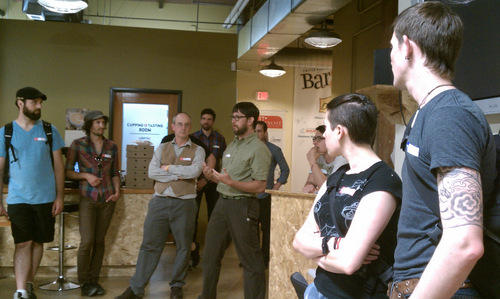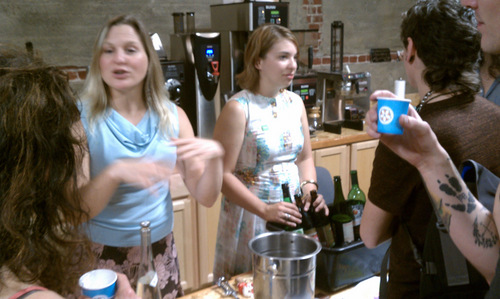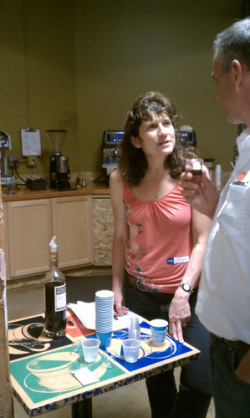When I first started learning about coffee, I listened in awe as people led cuppings, talking about “bright acidity” or “earthiness.” At first, I did not have a clue about what they were saying. Over time, though, the tasting vocabulary began to make more sense and I enjoyed the challenge of distinguishing the various taste elements in a coffee. I became what you might call a “coffee nerd,” one of many in the industry.
Coffee is not the only beverage with highly-enthusiastic tasters. Wednesday evening, Marcus Young of Batdorf & Bronson Coffee Roasters and Minott Kerr from Sterling Coffee Roasters organized an event that brought a wide variety of beverage companies together for an evening of tasting. Hosted by the American Barista and Coffee School, the Taste : Industry workshop was an opportunity to meet beverage professionals and learn how they talk about taste in their particular industry. We had the opportunity to sample coffee, coffee liqueur, bourbon, Scotch, pear brandy, hard cider, beer and wine.
 Marcus Young explains the evening's activities
Marcus Young explains the evening's activities
For me, the highlight of the night was the cider. Jennie Dorsey, a former Portland barista who now works as a rep for Tieton Cider Works, took us on a short tour of four cider-making countries: Spain (Basque Country), France, England and the United States.
Each country has its own unique traditions for producing cider, and the four we tried were very distinct. The Basque cider was rough around the edges, with a savory tartness similar to green olives. The French cider had a strong sulfur aroma and tasted cheesy, like a strong brie. The English cider was bitter and sharp, while the American cider was more refined and sweet like sparkling butterscotch. Explaining the differences, Dorsey talked about how our sense of taste is influenced by culture in addition to our physiology. For example, she said many of the flavors in the Basque cider would be considered “defects” if they showed up in an American cider.
 Jennie Dorsey (center) shared her cider knowledge
Jennie Dorsey (center) shared her cider knowledge
A couple tables down from the cider, Erika Degens from Stone Barn Brandy Works gave out samples of her Red Wing Roast coffee liqueur. Consisting of pinot noir brandy, a pear/apple spirit, spices and Yemeni and El Salvador coffees, the liqueur was lightly sweet and very complex. You would never confuse it with Kahlua.
 Erika Degens of Stone Barn Brandyworks
Erika Degens of Stone Barn Brandyworks
At the Migration Brewing table, I learned how adding oats to the malt of a beer gives it body without changing the color. I also learned that IPA is the abbreviation for India Pale Ale. In the days of the empire, before refrigeration was invented, the British used to export beer to India. To preserve the beer on the long sea journey, brewers would add extra hops to the barrels. The hops acted as a natural preservative and gave the ales extra bitterness. Beer drinkers became accustomed to the taste of the hops, and the hoppy beers became a whole new category to serve the market.
Other bits of trivia I learned during the event:
- When Scotch whisky spends time in American oak barrels, it turns a deep golden color. Aging in Spanish oak gives the whisky a darker amber color.
- Oak imparts vanilla and caramel flavors into whisky.
- A whisky blend like Johnnie Walker can be comprised of 30 or more different single-malt whiskies.
- Anything over 80 proof burns (drink slowly!).
- When you taste coffee and wine, you’re not supposed to swallow, but with whisky you do.
- The Williams pear is another name for a Bartlett pear.
- Pear brandy smells sweet and innocent, but it is neither.
In addition to tasting a lot of new things and catching up with some coffee industry friends, I also met Hanna Neuschwander, who told me about her book coming out in August, Left Coast Roast, a guide to more than 50 coffee roasters on the West Coast. It sounded like a fun project (and a good reminder to get back to work on my own book!).
The Taste : Industry workshop was an excellent gathering, all in the name of “education.” Thanks to all the sponsors and the organizers. I am certainly looking forward to the next one.